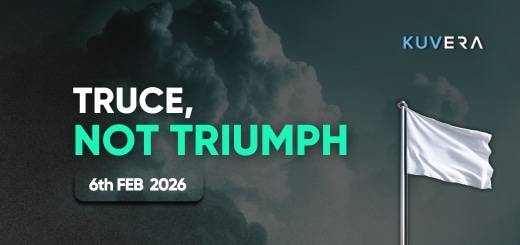On September 15, 2022, Adobe Inc.—the company behind Photoshop image editing tool and Acrobat PDF reader—agreed to acquire a web design software maker for $20 billion. Fifteen months later, in December 2023, that deal fell apart due mainly to a lack of regulatory approvals. Since then, Adobe’s shares have fallen nearly 40%.
What about the company it wanted to acquire? That company, Figma, raised $1.2 billion in an IPO and listed on the New York Stock Exchange this week with a 250% gain on its market debut that valued it around $45 billion!
Figma’s blockbuster IPO highlights the euphoria surrounding US tech stocks, especially in segments such as digital technologies, artificial intelligence, and cryptocurrency. Another case in point is that of the crypto company Circle Internet Group, which doubled on its NYSE debut in early June and is now up nearly 500%. And then there is CoreWeave, an AI company backed by chip giant Nvidia. CoreWeave tripled since its March debut and is worth nearly $55 billion.
But it’s not just the new entrants that are driving this boom—established tech giants such as Meta Platforms, Microsoft, Amazon and Apple are also going strong. And this week’s quarterly earnings reports prove just that.
Microsoft became only the second company to hit $4 trillion in market cap after reporting second-quarter earnings that exceeded expectations. Its quarterly revenue grew 18% to $76.4 billion while cloud computing business Azure’s sales jumped 39%. Earnings climbed 24% to $3.65 per share.
Facebook and Instagram parent Meta’s quarterly revenue of $47.52 billion and profit per share of $7.14 for the second quarter also exceeded analysts’ estimates.
Amazon, too, beat revenue and profit forecasts. Its EPS rose to $1.68 from $1.26 a year earlier and revenue jumped to $167.7 billion from $147.9 billion. But the performance of its cloud business AWS lagged peers like Azure.
Apple Inc smashed market expectations on better-than-anticipated iPhone sales. Its EPS was $1.57 on revenue of $94 billion for the third quarter, up from $1.40 and $85.7 billion in the same quarter last year. Its iPhone revenue increased 13.5% to $44 billion, defying worries over Trump’s tariffs and exceeding expectations of $39.8 billion.
Google parent Alphabet, which reported its results last week and topped forecasts, posted a 14% rise in revenue to $96.43 while profit jumped 20% to $28.20 billion
The big tech companies cited AI as a major reason for their growing revenue and said they will continue to invest heavily in AI. Microsoft said it would spend $30 billion in the current quarter while Alphabet lifted its spending forecast to $85 billion for the year from $75 billion before. Amazon said it would spend around $118 billion for the full year.
All in all, this is turning out to be a great quarter for US tech companies. Will the momentum sustain? We can’t predict that, of course, but we will certainly keep an eye out for you.

Ride Out the Bumps
In March 2008, when the global economy was battling a financial crisis, Ratan Tata made one of his boldest moves. That month, the Tata Group boss—who died last year—led Tata Motors Ltd to sign a deal to acquire British luxury car brands Jaguar and Land Rover from American automaker Ford for $2.3 billion, or about Rs 9,200 crore then.
The takeover raised concerns about Tata Motors biting off more than it can chew. After all, the deal value was nearly four times its net profit for the entire year that ended in March 2008. And Tata did struggle with JLR in initial years, before turning it around. Now, 17 years later, Tata Motors is doing an encore.
This week, India’s biggest automaker by revenue struck a deal to buy Italian truckmaker Iveco for about €3.8 billion, or roughly Rs 38,000 crore. This time, too, it is facing concerns about the acquisition’s rationale.
However, while the Iveco deal’s size maybe four times that of the JLR acquisition in rupee terms, it probably won’t bother Tata Motors as much. That’s because Tata Motors is far bigger than it was in 2008. For FY25, it clocked consolidated revenue of Rs 4,39,695 crore and net profit of Rs 28,149 crore. That’s more than 10 times the 2008 levels.
The numbers apart, what does the acquisition mean for Tata Motors? The deal will boost the company’s commercial vehicles business. The combined Tata-Iveco business will sell over 540,000 units a year and have revenue of €22 billion.
Tata and Iveco said the takeover will bring together two businesses “with highly complementary product portfolios” and with “substantially no overlap” in their industrial and geographic footprints. This is indeed correct. While Tata is India’s biggest truck and bus maker and operates in some overseas markets such as South Korea and Indonesia, it has virtually no presence in these segments in Europe. Iveco, which also makes buses and engines, fills that gap.
Iveco generated 74% of its revenue in Europe last year though it is among the smallest of Europe’s leading truck makers. It trails market leaders like Sweden’s Volvo, Germany’s Daimler and Volkswagen Group’s Traton, which houses brands such as Scania and MAN. Tata’s backing could help it tilt the scales a little.
Tata Motors won’t have any difficulty in financing the takeover—it is initially taking a $4.5 billion debt but will then raise over $1.1 billion in equity to pay for the deal. But will the deal help to stem the decline in its shares and soothe investors’ concerns about growth prospects in Europe and rising debt?
Its shares have slumped more than 40% from August last year, lagging the Sensex and Nifty’s 6% drop by a wide margin. It will need more than just a truckmaker in Turin to ride out this bump in Mumbai.
tl;dr Hear the article in brief instead?
Brace for the Future
While Tata Motors is bulking up, another Tata Group company is trimming down.
Tata Consultancy Services is reducing its global headcount by 2%. This means that India’s largest IT services provider will cut almost 12,200 jobs from its workforce of more than 613,000.
Why is TCS doing it? The company cited a strategic change in its operations for the job cuts and says it wants to be a “future-ready organisation”. What it stopped short of saying is that it now requires fewer people than before in certain roles as it increases deployment of artificial intelligence and other technologies.
These job cuts are significant. For one, these layoffs will mainly affect middle and senior management—people in their late 30s or 40s and above, who are earning relatively higher salaries and who may now find it difficult to find similar jobs.
Also, the layoffs by India’s biggest software services company sends strong signals to the rest of the $283 billion IT industry. It highlights the negative impact of AI on the industry. It also tells other IT companies that demand outlook remains uncertain due partly to Donald Trump’s tariff policies and clients deferring non-essential projects.
TCS, like most Tata Group companies, was until now considered a stable place to work. The layoffs could change that perception, at least a little. The layoffs could also have a ripple effect on the broader IT industry—job hunting (and hopping) may get a tad difficult and wage growth may stall. It could also affect some other sectors such as real estate, where IT professionals drive demand for housing and IT companies drive demand for office space.
Trump Tirade
Talking about Trump’s tariff policies, the US President resumed his offensive this week. Ever since taking office in January, Trump has been imposing tariffs, postponing them, changing the rates, and engaging in trade deals. This uncertainty created chaos in stock, bond, currency and commodity markets not only in the US but also in India and other countries.
In April, Trump imposed a 10% baseline tariff on all of America’s trading partners and an additional reciprocal tariff whose rates varied for each country. But he then paused most of these tariffs for 90 days, and then until Aug 1. During this period, he managed to strike trade deals with a couple of countries such as the UK.
This week, he pressed ahead with tariffs for as many as 69 countries including 25% on imports from Indian. He criticized India for its “strenuous and obnoxious” non-monetary trade barriers and threatened to impose a penalty on India for buying Russian oil. “I don’t care what India does with Russia,” he posted on social media. “They can take their dead economies down together, for all I care.”
Trump also increased duties on Canada to 35% from 25%, and set rates of 50% for Brazil, 20% for Taiwan, 39% for Switzerland and 19% for Thailand. These tariffs come even as India and the US have been negotiating a trade deal. According to media reports, talks have been stuck over India’s refusal to budge on agricultural imports from the US.
The fresh tariffs also hurt investor sentiment, sending stocks and the rupee lower. However, this time, many stock market investors feel the latest tariffs are a pressure tactic and that rates will fall once the India-US trade deal is finalised. But just in case the rates don’t fall, Indian exporters in particular and the overall economy in general will take a hit.
Market Wrap
Indian stock markets ended lower for the fifth consecutive week after Trump’s new tariff announcements renewed growth concerns and as foreign portfolio investors continued their selling spree.
Both the Sensex and the Nifty slipped about 1.1% this week. The small-cap index lost 3.4% while the mid-caps dropped 2.4%.
As many as 14 of the 16 major sectors ended lower this week, led by a 3.3% drop in the pharma index after Trump said he would push drugmakers to reduce prices.
Only seven of the 30 Sensex stocks and 14 of the Nifty companies managed to end the week in the green. Gainers were led by Hindustan Unilever, Larsen & Toubro and Asian Paints after posting strong first-quarter earnings. Tata Group retailer Trent, Jio Financial, ITC, bike makers Hero MotoCorp and Eicher, and Tata Consumer also bucked the broader trend.
Adani Enterprises was the biggest loser after reporting quarterly profit nearly halved. All five IT stocks–Wipro, TCS, HCL Tech, Infosys and Tech Mahindra–fell amid concerns of a slowdown. Tata Motors slumped more than 5% after its Iveco purchase fuelled worries of an increase in debt while Kotak Mahindra Bank slumped on worries over weakening asset quality.
Drugmakers Dr Reddy’s Labs and Sun Pharma fell more than 4% each while Cipla slipped nearly 2%. Tata Steel, Titan, Bajaj Finance, Bajaj Finserv and Adani Ports were among the other main laggards.

Earnings Snapshot
- Mahindra & Mahindra profit rises 32% to Rs 3,450 crore, tops forecasts
- Hyundai India Q1 profit drops 8% to Rs 1,369 crore but exceeds market estimates
- Maruti Suzuki profit climbs to Rs 3,712 crore from Rs 3,650 crore a year earlier
- Royal Enfield maker Eicher’s profit rises to Rs 1,205 crore from Rs 1,101 crore a year earlier
- TVS Motor profit jumps 35% to Rs 779 crore, beats analysts’ estimates
- Tata Steel consolidated net profit more than doubles to Rs 2,078 crore, beats estimates
- L&T consolidated profit after tax jumps 30% to Rs 3,617 crore, exceeds analysts’ expectations
- IndiGo profit falls 21% to Rs 2,161 crore from Rs 2,727 crore a year ago
- Asian Paints consolidated net profit falls 6% to Rs 1,100 crore but matches forecasts
- Kotak Mahindra Bank standalone net profit plunges 47.5% to Rs 3,281 crore
- IndusInd Bank Q1 profit slumps 68% to Rs 684 crore
- Torrent Pharma consolidated net profit rises 20% to Rs 548 crore
- GAIL India net profit drops 30.8% to Rs 1,886 crore, misses forecasts
- Adani Enterprises consolidated net profit drops to Rs 734 crore from Rs 1,455 crore year ago
- Adani Total Gas consolidated net profit falls 3.8% to Rs 165 crore
- Adani Green Energy consolidated profit rises 31% to Rs 824 crore
- Dabur consolidated net profit rises 3% to Rs 514 crore, beats market expectations
- Swiggy consolidated net loss widens to Rs 1,197 crore from a loss of Rs 611 crore year ago
Other Headlines
- France’s Schneider Electric to buy Singapore firm Temasek’s 35% stake in Indian JV for €5.5 billion
- Lenskart files for IPO, to raise Rs 2,150 crore in fresh issue; SoftBank, Temasek to pare stake
- NSDL’s Rs 4,012 crore IPO fully covered within hours on first day
- SEBI proposes lifting allocation for institutions, reducing for retail investors in large IPOs
- Supreme Court to reconsider order scrapping JSW Steel’s $2.3 billion Bhushan Power deal
- SEBI seeks trading data from stock exchanges in wider Jane Street probe
- IMF raises India’s GDP growth forecast to 6.4% from 6.2% for 2025, 2026
- RBI caps investments by banks, NBFCs in alternative investment funds at 20%
- India launches NASA-ISRO radar imaging satellite to track climate threats from space
- Google to invest $6 billion to develop 1-GW data centre in Andhra Pradesh
- Directorate General of Civil Aviation finds 263 lapses at Indian airlines in annual audit
- Co-working firm IndiQube falls 9% in stock market debut
- Sports goods seller Decathlon says will double India sourcing to $3 billion in five years
- Electric cab firm BluSmart enters insolvency proceedings
- American agrichemicals firm FMC Corp to sell India business citing market pressures
- India, New Zealand wrap up second round of talks on free trade agreement
That’s all for this week. Until next week, happy investing!
Interested in how we think about the markets?
Read more: Zen And The Art Of Investing
Watch here: Investing in International Markets
Start investing through a platform that brings goal planning and investing to your fingertips. Visit kuvera.in to discover Direct Plans and Fixed Deposits and start investing today. #MutualFundSahiHai #KuveraSabseSahiHai










